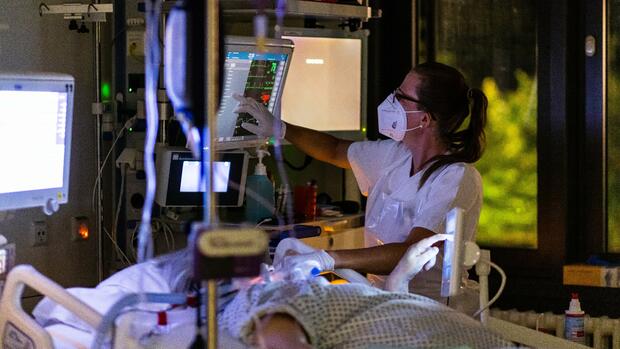The company Deutsche Fachpflege looks after around 8,500 patients in Germany.
(Photo: dpa)
Frankfurt A billion-dollar deal is looming in the German care market. The financial investor Advent has put up for sale the company Deutsche Fachpflege, which specializes in out-of-hospital intensive care, according to several people familiar with the matter. The investment bank Rothschild has contacted the first possible bidders, but an official auction process has not yet started. Advent, Rothschild and the company declined to comment.
With 11,000 employees, German specialist nursing cares for around 8,500 people. These include around 1,800 intensive care patients whose vital functions have to be monitored using technical devices. Often they have suffered neurological injuries, for example from an accident or a stroke, are artificially ventilated or are in a coma.
The German specialist care also has offers in the normal care of the elderly and sick. The company has a total of 260 locations, and many patients are cared for in shared apartments or at home.
Advent took over the company in 2018 and merged it with competitors Bonitas and the nationwide intensive care group in 2020. The Herford-based company generates an annual operating result of around 100 million euros and could be valued at around twelve times that if sold, according to financial circles. That would correspond to around 1.2 billion euros.
Other private equity firms as well as infrastructure funds are potential buyers. Sovereign wealth funds are also increasingly venturing into the area of social infrastructure: Mubadala from Abu Dhabi bought the European dialysis chain Diaverum for a good two billion dollars in April.
Statements by Lauterbach cause uncertainty
However, the sale starts in a challenging environment. Financial investors are currently finding it difficult to take on debt to finance takeovers. The debate initiated by Health Minister Karl Lauterbach (SPD) about making it more difficult for private equity to buy medical care centers (MVZ) has also caused uncertainty among potential bidders. Lauterbach had chosen drastic words and spoke of “locusts” with “absolute greed for profit”.
According to an expert report, a law restricting private equity investments could worsen local outpatient care, especially in rural areas. According to a transaction monitor by the consulting firm PwC, there were 186 takeovers in the healthcare market in Germany in 2022 than in previous years, above all purchases of practices by MVZ chains.
The scandal surrounding the French nursing home operator Orpea showed the reputational risks associated with the sale of a care chain. The company was accused of massively violating hygiene and personnel standards in order to maximize profits, and the general director had to leave the company as a result.
In Germany, the financial investor Nordic Capital abandoned initial efforts to sell its Alloheim care group last spring. The search for a buyer for the eye clinic chain Artemis, the dentist chain EDG (Dein Dental) and the psychiatric chain Oberberg Kliniken, which started in 2022, also did not come to a conclusion due to the difficult general conditions.
The financial investor Ergon Capital had started an auction for the rival of German specialist care, Opseo, in the autumn, but then paused the project. That sale process could resume in the coming months, according to several people familiar with the matter.
Numerous deals in the healthcare industry
While private equity firms have been reluctant to sign new deals in recent months, mid-sized healthcare deals have been an exception. However, it was mostly companies from the fields of medical technology or health technology. The sector is currently enjoying increased attention from investors with its products that are considered non-cyclical.
In Germany, Nordic Capital acquired the defibrillator manufacturer Corpuls in April. According to financial sources, CVC, Oakley and Jacobs Holding recently advanced to the final round of bids in the auction for vitamin pill manufacturer Sunday Natural, which could be valued at up to 700 million euros.
Laboratory service provider Qiagen has selected four bidders – EQT, Astorg and Montagu and Novo Holdings – for the final round of sales for a minority stake in its €750 million to €1 billion health data (bioinformatics) business, according to people familiar with the matter.
In addition, companies such as the medical technology manufacturer Klingel Medical, worth a good half a billion euros, or the diagnostic instrument manufacturer Heine Optotechnik, which could be valued at a good 300 million euros, will soon be entering the market. The sale of a stake in the prosthesis manufacturer Ottobock is also in preparation. The companies and bidders declined to comment or were initially unavailable.
More: Why Germany has far too many clinics – and the emergency rooms are still overcrowded
